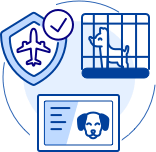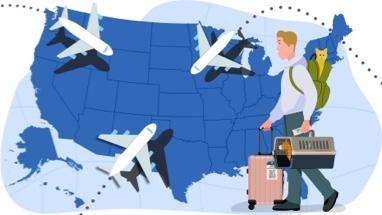Pet Travel From the United States to South Africa
Travel Requirements Based on Pet Type
Carefully read ALL of the requirements related to your pet on this page.
- This page provides the most recent entry requirements and can change without notice.
- It is the responsibility of the veterinarian to make sure the pet has met all health requirements of the destination country before issuing a health certificate.
- Failure to meet the requirements may result in problems gaining certificate endorsement or difficulties upon arrival in the destination country.
- Health certificates must be legible, accurate, and complete.
Alert
All pet veterinary health certificates to South Africa MUST BE endorsed by USDA-APHIS, including Service and Emotional Support Animals.
All disease testing, including test type, must comply with the requirements outlined on the veterinary health certificate. Failure to comply with the requirements in the veterinary health certificate may result in the pet being returned to the U.S. or euthanized.
A veterinary import permit is required for all cats traveling to S. Africa. Veterinary import permit applications and further information can be found on the Republic of South Africa’s website at https://www.gov.za/services/import/import-animals-and-animal-products. The completed veterinary permit applications can be sent to the Permit Office at VetPermits@daff.gov.za.
The requirements for traveling with your pet are described in the health certificate.
Veterinary Health Certificate for Cats (99.26 KB)
A veterinary import permit is required for all dogs and cats traveling to South Africa. Veterinary import permit applications and further information can be found on the Republic of South Africa’s website at https://www.gov.za/services/import/import-animals-and-animal-products. The completed veterinary permit applications can be sent to the Permit Office at VetPermits@daff.gov.za.
If South Africa approves the import application, they will issue an import permit and provide the required veterinary health certificate which will detail the entry requirements. Please share the import permit and veterinary health certificate with your USDA-accredited veterinarian as soon as you have received it.
U.S. origin dogs entering South Africa are required to be test negative for Trypanosoma evansi (surra) on both the CATT and Giemsa blood smear tests. All surra testing must occur at one of the two internationally recognized OIE Reference Laboratories for surra testing (see below for further instructions on sample submission procedures).
All other required tests must be completed at an officially approved laboratory located in the United States.
The animal's microchip number must be recorded on all laboratory reports.
APHIS endorsement of the health certificate is required after it has been issued by a USDA Accredited Veterinarian. Health certificate issuance and endorsement must occur within 10 days of the pet's travel.
Guidance document for Dogs traveling to South Africa (313.88 KB)
Note: The Institute of Tropical Medicine highly recommends that U.S. sample submitters either create their own account DHL International Shipping or use a commercial laboratory (Ex: ANTECH) when sending samples to Belgium to avoid samples being returned.
***You must forward the shipment tracking number to the Institute of Tropical Medicine Antwerp dispatching service in advance of the shipment: shipments@itg.be and surra@itg.be
Per the ITM Import Permit, the text “Diagnostic samples - Do not open during transport” must be printed on the parcel, along with a copy of the ITM Import Permit attached to the exterior.
Institute of Tropical Medicine Antwerp
Applied Technology and Production Unit
Nationalestraat 155
B-2000 Antwerpen
BELGIUM
Tel: +32 (0)3 247 63 74
surra@itg.be
PLEASE NOTE: The Institute of Tropical Medicine in Antwerp, Belgium will be closed from December 23, 2024, through January 5, 2025. No samples will be accepted during this time. The last day of routine testing for this year will be Thursday, December 19th. Any samples received after that time will not be tested until January 5, 2025.
Sample Submission to the Institute of Tropical Medicine (1.73 MB)
National Research Center for Protozoan Diseases
Obihiro University of Agriculture and Veterinary Medicine
Inada-cho Nishi 2-13
Obihiro, Hokkaido 080-8555
JAPAN
Tel: +81-155 49.56.47 Fax: +81-155 49.56.43
ircpmi@obihiro.ac.jp
Sample Submission to the Nat’l Research Ctr for Protozoan Diseases (211.47 KB)
Birds for export using the below health certificate must:
- Have a South African import permit
- Have been born and remained in captivity
- Have remained in the United States for at least 3 months prior to export to South Africa
- Be identified by means of closed leg rings or microchips
- Undergo a 28-day pre-export isolation in a facility (which could be a private residence) that was approved by an APHIS inspector before the start of isolation. To schedule an APHIS inspection, please contact your APHIS Endorsement Office.
- Tested for avian influenza and Newcastle disease by means of both tracheal/oropharyngeal and cloacal swabs, twice at least 14 days apart, the second test being within 7 days of departure
- Be transported to South Africa in a sealed transport that is covered in mosquito proof netting
Other requirements are explained in the model health certificate below.
Veterinary Health Certificate for Birds (173.03 KB)
A veterinary import permit is required for all lagomorphs (including rabbits, hares and pikas) traveling to South Africa. Veterinary import permit applications and further information can be found on the Republic of South Africa’s website at https://www.gov.za/services/import/import-animals-and-animal-products. The completed veterinary permit applications can be sent to the Permit Office at VetPermits@daff.gov.za.
The requirements for traveling with your pet are described in the health certificate.
Veterinary Health Certificate for Lagomorphs (161.14 KB)
For pet travel requirements not listed, APHIS has not been officially informed by the foreign country about the requirements for your pet’s travel. We recommend that you contact a government official of the country you are traveling to for more information.
Country of Destination Contact Information
Countries Participating in the European Union
Austria
Belgium
Bulgaria
Croatia
Cyprus
Czech Republic
Denmark
Estonia
Finland
France
Germany
Greece
Hungary
Republic of Ireland
Italy
Latvia
Lithuania
Luxembourg
Malta
Netherlands
Northern Ireland*
Norway**
Poland
Portugal
Romania
Slovakia
Slovenia
Spain
Sweden
Switzerland**
* Northern Ireland is part of the United Kingdom (UK), but will continue to follow European Union (EU) requirements even though the UK is no longer part of the EU.
** Norway and Switzerland are not part of the EU but have adopted EU legislation for import of most species of live animals.
Need Help?
Still Have Questions?
USDA-Accredited Veterinarians
Contact a USDA-accredited veterinarian for questions about your destination country's entry requirements for pets (including any needed vaccinations, tests, or treatments) and for issuance of health certificates.
Find a USDA-Accredited Veterinarian
USDA Endorsement Offices
Contact your nearest APHIS Veterinary Export Trade Services Endorsement Office for questions about endorsing a health certificate for pets.
Looking for Another Country?
Find your destination country requirements by using the dropdown menu below. If your country is not listed in the menu, visit Pet Travel: Unknown Requirements.




